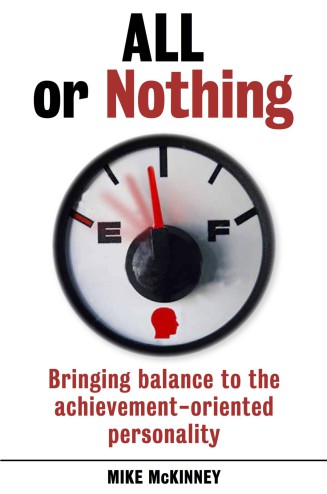
by Mike McKinney
Do you describe yourself as ‘goal-directed’? Or ‘extremely competitive’? Do you have a strong desire to achieve? To win, at all costs? Do you push yourself to your very limits? Or maybe this describes your partner. Maybe you’re a manager and think this type of personality is all positive. If so, this book is a must-read.
In spite of being useful for others, the book is addressed primarily to the person who sees him- or herself as an All or Nothing person. Unusually, some of it is written in the second person (e.g. “You will be pleased to hear that the goal of shifting this behaviour is not to turn yourself into an ‘average’ or ‘lazy’ person.”)
The key to the underlying theme in the book is the word ‘balance’ in the sub-title. Although career (or sports) uber-motivated people are often highly successful, there are costs. McKinney’s aim is to present the evidence for the achievement of balance, which is not only helpful for the All or Nothing person’s sense of contentment and that of the family but, in the long run, is conducive to achieving long-term goals.
The All or Nothing person wants perfection. Unfortunately, the world being as it is, perfection is only sometimes achievable. Mood-related problems like depression and anxiety can result when things don’t go according to plan (even the most well-developed and beautifully devised designs) and can proceed to the dreaded ‘burn-out’. When things go wrong and working to the nth degree is no longer fun, A/N people can suffer from a sudden and devastating loss of self-confidence, and a drain of their energy reserves and maybe even crash – give up altogether – meaning not only the task, but the job and everything else as well. Change (such a frightening word when the A/N person knows that hard work and lots of it has always been the secret to success) is key. As McKinney says:
You will have noticed by now [p 119] that this book is not about eliminating or ‘curing’ problems. Rather, it presents an approach of understanding what factors are operating within the individual at a given time and then considers how to modulate these.”
Some niggles: why did the publisher choose to print the book in a wafer-thin grey font, and, worse, put the case histories in boxes using the same typeface but now on a grey background which reduces contrast even further? Easy reading is restricted to perfect lighting conditions. Second, somehow the editing allowed McKinney’s propensity to split his infinitives remain uncorrected and every one of them jars. Third, someone should have told him that exclamation points are better restricted to emails. Little niggles, but each one takes the reader away from the message. And that message is important.
The world needs a dose of All or Nothing, but never to the extent that people hurt themselves. The A/N person is his/her own worst enemy, of course. McKinney never tries to sell his points, merely pointing out that being a successful person is possible with a smidgeon of flexibility, a healthy regard for important people in your life and the introduction of pleasurable activities that provide their own rewards. Balance.
Author: Mike McKinney
Publisher: Exisle Publishing
ISBN: 9781925335262
RRP: $34.99
Available: bookshops

 RSS Feed
RSS Feed
